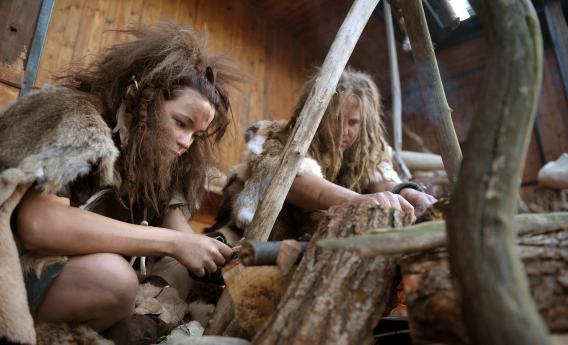
What do you want in a mate? If you’re a free-thinking, independent, feminist woman in a relatively egalitarian society, you might want all kinds of things: a guy with a sense of humor, maybe, or who likes to cook exotic foods. And if you’re not overly familiar with certain annoyingly persistent theories of mate selection, you’ll be surprised to find out that you’re looking for all the wrong qualities, evolutionarily speaking. You’re supposed to want someone stronger, smarter, and richer than you. Someone who would sire healthy offspring and protect them from saber-toothed cats on the Pleistocene Epoch savanna.
And if you’re a free-thinking, independent, feminist man in a relatively egalitarian society, you might not realize that you are supposed to prize youth, fertility, and chastity (a woman who will birth all those babies you’re supposed to protect and let you know they’re really yours) over quirky taste in movies or a love of travel.
There’s nothing inherently wrong with evolutionary psychology—our thoughts and behaviors have been shaped by millions of years of hominid evolutionary history, and it’s worth studying how natural selection acted on traits that we still express today. But too often, evolutionary psychology is a force for social conservatism. Researchers identify a pattern of behavior, usually some stereotypical sex difference (in part because it’s easy to measure whether men and women score differently on a standardized test), construct a scenario in which that behavior would have been adaptive in the distant past, and say the behavior is therefore evolutionarily selected and encoded in our genes.
David Buss, an evolutionary psychologist at the University of Texas, is the worst. He has theorized that women are jealous of pretty rivals and men are jealous of rich ones, that men prefer more sexual variety than women do, that women need to trap a mate and men are motivated to sleep around—and attributes all of these traits to our genetic makeup. Also, you may think your opposite-sex friends are just friends, but he thinksyou’re fooling yourself. And he’s a big proponent of the idea that men and women areseeking fundamentally different qualities in a mate. Because, he says, of evolution—and that’s the problem.
It’s tricky to disprove the notion that some human trait is the result of evolution. The logic is circular: if some trait exists, it must not have been fatal to our ancestors and it may have helped them reproduce. To critique a claim of evolutionary privilege, you have to show that the trait has no genetic component and therefore can’t be inherited, or demonstrate that the trait is instilled by culture, not necessarily biology.
And that’s why my favorite paper of the week is “Stepping Out of the Caveman’s Shadow: Nations’ Gender Gap Predicts Degree of Sex Differentiation in Mate Preferences.” Marcel Zentner and Klaudia Mitura of the University of York, U.K., asked more than 3,000 people in 10 countries what they valued in a mate. On a four-point scale, people rated the importance of various qualities: chastity, ambition, financial prospects, good looks, etc.—all identified by Buss and his likeminded peers as being qualities that only men or only women are evolutionarily predisposed to seek out.
The researchers used a World Economic Forum measure of gender equality to rank the 10 countries as (a) relatively gender-equal, (b) backwards but improving, or (c) screamingly sexist (my terms, not theirs). And the results were clear: The more egalitarian the country, the less likely men and women were to value traditional qualities that Buss and co. believe to be innate. In Germany, women said they’d very much like a man who is a good housekeeper. In Finland, men were more likely than women to prefer a mate a bit smarter than themselves. In the United States, women ranked chastity as more important than men did. At the other end of the scale, in Turkey and South Korea, women wanted mates with good financial prospects and men valued good cooks.
None of this is especially surprising, but there’s something so satisfying about having a chart with a straight line and a steep slope showing that the more egalitarian the country, the less constrained people are by stereotyped sex roles. That is progress.
The study fits with other recent research showing that supposedly gender-determined cognitive abilities, like math and spatial reasoning, are also a function of culture. The more egalitarian a society, the better girls are at algebra.
You can read about mate preferences and sex roles changing in real time in my colleague Hanna Rosin’s new book, The End of Men: And the Rise of Women. An excerpt that ran in the New York Times Magazine over the weekend told the stories of women who are adapting (take that, Pleistocene Epoch!) to the new economy and becoming bread winners for husbands who are trained for self-described macho jobs that have disappeared.
And that’s the real lesson of evolutionary psychology. The main quality evolution acted on over all those millions of years was our ability to adapt. It’s possible there are some ugly, genetically-predisposed legacies of jealousy and mate guarding and sexual deception rattling around in our great ape brains, but they’re nothing compared to our capacity to form friendships, value a relationship independent of its ability to produce offspring, and love a highly evolved guy for baking a great loaf of bread.
No comments:
Post a Comment